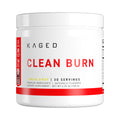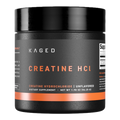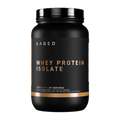Creatine is one of the most well-researched supplements in existence.
It has been used for decades by athletes to improve performance, help build muscle, and increase strength.*
The original, most well-researched form of creatine is creatine monohydrate. If you hear people talk about creatine, they’re likely talking about creatine monohydrate. However, it’s not the only form. Today, we'll compare it to the second most popular option, creatine hydrochloride, or creatine HCl.
Which one's best for you depends on your preferences and tolerance. At Kaged, we sell and market both because we believe they each have their place.
Quick Facts: Creatine Monohydrate vs HCl
Benefits: Both monohydrate and HCl increase phosphocreatine levels, which support strength, muscle, and overall performance.
Solubility: Creatine HCl mixes more easily in water and with less water. This means you can take creatine and experience less bloating and water retention.
Cost: Creatine monohydrate is more cost-effective. Kaged Creatine Monohydrate comes at just 30 cents per 5g scoop.
Flavors: Creatine HCl comes in fruit punch, lemon lime, unflavored powder, or capsules. Our monohydrate comes in unflavored powder.
Optimal Dose: Despite the common myth that HCl brings the same benefits with a lower dose, both forms require 3-5g per day for best results.
Best For: Creatine monohydrate is the best default option. It's easy to add to any stack. Creatine HCl is best for those with GI sensitivity, physique competitors concerned with water retention, or those who prefer the extra options HCl comes in.
|
Creatine Monohydrate |
Creatine HCl |
| Solubility |
Even micronized, it requires more water to mix fully |
Mixes easily in less water than monohydrate |
| Can Increase Phosphocreatine Levels* |
Support strength, muscle, and performance |
Support strength, muscle, and performance |
| Flavors |
Unflavored powder |
Fruit Punch, Lemon Lime, Unflavored, Capsules
|
| Cost |
More cost-effective |
More expensive
|
Optimal Dose
|
3-5g per day |
3-5g per day
|
| Best For |
Highest value, who don't mind unflavored powder
|
Those with GI sensitivity, physique competitors, or those who prefer flavors/capsules
|
Let's get more into the details of the differences between creatine monohydrate and HCl.

Difference #1: Molecular Structure
Understanding the differences has to start with their underlying chemistry. Function follows form.
Creatine Monohydrate consists of one creatine molecule combined with one water molecule.
Creatine HCl is formed by attaching a hydrochloride (HCl) group to the creatine molecule. This chemical change leads to one key difference: higher solubility for Creatine HCl

Difference #2: Creatine HCl Mixes Much More Easily
Solubility, or in this case, ‘aqueous solubility’ (solubility in water), describes how well creatine mixes and is absorbed.
Below is a list of the common creatine forms and their relative solubility score (the higher the score, the greater the solubility).
As you will see, creatine HCl has by far the best solubility.
Creatine Monohydrate: 1.0
Creatine Citrate: 3.0
Creatine HCI: 37.9
High solubility = easy mixing
Here are the effects this can have.
Creatine HCl is less likely to clump
Because it mixes more easily, it’s less likely to clump at the bottom of your shaker bottle.
Creatine HCl may be easier to take on its own
Because it mixes more easily, it’s also more practical for flavored creatine drink mixes. This is some insider baseball on formulating supplements, but it’s thanks to this property of creatine HCl that we’ve been able to make our popular fruit punch and lemon lime-flavored creatine HCl products.
Creatine HCl may be easier to stack
Because it mixes easily, creatine HCl can easily be added to pre-workout products and other supplement stacks (we put it in Pre-Workout). At Kaged, one of the most popular stacks is unflavored Creatine HCl with Hydration.
This Doesn't Always Matter
If you mix creatine monohydrate in a post-workout shake, you likely won't notice any clumps.
Using more water also helps creatine monohydrate mix, so if you use creatine monohydrate, be sure to follow the directions.
Micronized Creatine Monohydrate Can Help This
In Kaged Creatine Monohydrate, we use a “micronized” form of creatine monohydrate. This means it contains small particles, which help it mix more easily in water. It still won’t mix as easily as Creatine HCl, but it can make this less of a factor.
Difference #3: Water Retention
Creatine and water have a well-known relationship.
Many sources of creatine, including typical creatine monohydrate, may require a large amount of water to mix into a beverage form.
This is often why some people experience digestive issues and extracellular (outside the cell) water retention with creatine.
While creatine supplementation comes with a necessity to focus on hydration, many athletes like Creatine HCl because they can take the same amount of creatine with less water than would be required to make monohydrate easily mixable.
This also may make creatine HCl the better choice if you’re looking to avoid the puffy, water-retained “bloating” look.
For this added benefit, many bodybuilders and physique competitors turn to creatine HCl.
Difference #4: Less GI Distress with HCl
This is also related to the solubility. For those struggling with GI discomfort/distress on their regular creatine supplement, like creatine monohydrate, switching to Creatine HCI, which you can easily mix with less water, could help.
However, many people report no problems or GI discomfort with creatine monohydrate.
If you’ve tried creatine monohydrate and experienced side effects like stomach discomfort, consider trying creatine HCl. If not, then there's no problem with creatine monohydrate
Difference #5: Creatine Monohydrate Has More Research, But Does This Matter?
One consistent argument in favor of creatine monohydrate over newer forms is that the vast majority of research on creatine has been on monohydrate.
That's true. However, creatine HCl has been shown to increase phosphocreatine levels, and this is the mechanism through which creatine monohydrate works. As such, we have every reason to believe that creatine HCl provides the same benefits. This is why it's important to understand the underlying science of what creatine does.
Studies that have compared the two directly, like this October 2024 study, concluded that "creatine monohydrate and creatine HCl significantly enhanced the beneficial effects of resistance training on strength, hypertrophy, and hormonal responses." They continue that creatine HCl showed no benefit over creatine monohydrate. In other words, they have shown similar effects. It's no surprise when you understand the mechanism.
Difference #6: Creatine Monohydrate Is More Cost-Effective
We pride ourselves on taking low margins on our supplements, to bring the highest quality at reasonable prices. We can tell you first-hand that creatine monohydrate is much less expensive to produce. There's no doubt that monohydrate is the more cost-effective choice.
So what are you paying for with creatine HCl? Ultimately, it's up to you to decide if the unique benefits of creatine HCl are worth it for you. If you prefer the flavored options, want to mix it in less water, or are concerned with GI issues, then HCl is for you.
Choosing The Right Creatine For Your Goals
With this article, we’ve aimed to give you a nuanced understanding of the differences between the two forms, rather than declaring one as a hero and the other as a total waste. At Kaged, we offer both types of creatine because we believe both have their place. All Kaged Creatine is third-party tested to be free of banned substances by Informed Sport.
If you're a beginner and wondering how best to use creatine, check out our guide on creatine for beginners.

SHOP ALL CREATINE
Creatine HCl vs Monohydrate Frequently Asked Questions
Do I Need To Use a Loading Phase For Creatine Monohydrate or Creatine HCl?
Creatine loading is a debated topic within the bodybuilding community. The answer to whether or not you should load creatine may depend on the source and an individual’s goal.
Both sources of creatine do not need to be loaded. Loading provides no additional benefit in the long-term (Willoughby et al., 2006). However, loading may help you saturate the cells a few weeks faster.
This goes for both creatine monohydrate and creatine HCl. If you want to load creatine at the start, you can.
The research shows that without loading creatine it takes at least 28 days to accumulate in the body before providing benefits.
In simple terms, creatine loading is the fast-track, but it’s not necessary.
There’s no evidence that you should approach the loading phase any differently with either form.
When Should You Take Creatine?
Regardless of the form you choose, it’s important to stay consistent. It has been shown that as long as you're consistent with taking it, you’ll get the benefits of creatine.
What Is The Benefit of a Loading Phase?
Creatine supplementation only shows benefits after the muscle cells begin to saturate with creatine. The logic of the loading phase is to give your body a superdose of creatine for your first week of supplementing in order to more quickly saturate your muscles.
Isn’t Hydrochloric Acid Harmful?
If you were an astute chemistry student, you may remember HCl as a highly acidic, potentially dangerous compound. Creatine is a weak base, and hydrochloric acid is a strong acid. When the two combine together, they neutralize one another, creating the stable creatine hydrochloride.
Can I Take Smaller Doses of Creatine HCl And Get The Same Benefit?
Since creatine HCl is more soluble, this has led to claims about higher absorption, and therefore needing a lower dose to get the same effect.
However, this has not been backed up by the research. To saturate your muscle cells with creatine, you will still want to take the recommended dose on the label.
For the best results, you should take the same amount of creatine HCl as you would creatine monohydrate.
Do I Need to Cycle Either Form of Creatine?
Another popular strategy to cycle your creatine intake; however, no research has shown this to be superior to a consistent, daily dose.
Without evidence of health risk or performance improvements from cycling, you may just be wasting periods of time when your creatine stores become depleted.
Countless users have taken creatine daily for years without cycling it and have seen no adverse effects. In fact, they simply continue to gain from the benefits of creatine.
This goes for creatine monohydrate, creatine HCl, and other forms of creatine.
What Are Common Side Effects of Creatine?
Since creatine causes your body to retain water, when you start taking creatine, you may experience slight weight gain. This is not fat or muscle, but water. It’s nothing to worry about as long as you stay hydrated.
The other commonly reported side effect of creatine is stomach discomfort and GI distress. If you experience this with creatine monohydrate, consider trying creatine HCl.
Should I Take Creatine Powder or Capsules?
This depends on your preference. Powder can be better for a loading phase and if you're taking it as part of a stack. Capsules can be more convenient. We offer both.
For more on this, check out this article on creatine powder vs pills (capsules).
Are There Other Types of Creatine?
Yes. There are many. In our most powerful pre-workout, Pre-Workout Elite, we use a form of creatine called Creatine Nitrate (NO3-T®). We added it to this pre-workout because it works as a 2-in-1 supplement, providing the performance benefits of creatine while helping improve your muscle pumps. Simultaneously a quality creatine and nitrous oxide booster, NO3-T® can also enhance endurance, allowing you to train harder and longer.*
We write about this more in this article on creatine monohydrate vs creatine nitrate.
*These statements have not been evaluated by the Food and Drug Administration. This product is not intended to diagnose, treat, cure or prevent any disease.



































